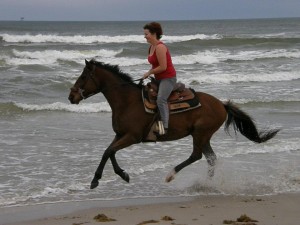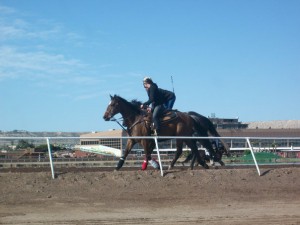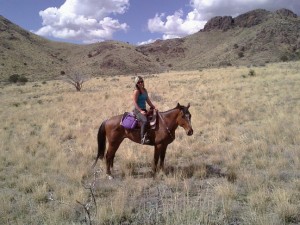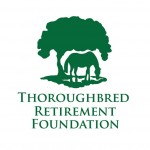Working on the racetracks of New Mexico, Laura Holmes led a hard life.
Between witnessing the high rate of breakdowns, and imagining the sickening deaths of equine athletes in nearby Mexican slaughterhouses, she was compelled to help.
In conjunction with her ongoing work helping to re-home ex-racehorses, Holmes recently launched the Facebook Page OTTB Connect. In it, she hopes to offer a forum for discussion about all manner of issues related to Thoroughbreds, as well as provide a place to display information about sale horses who don’t make it onto other Sales Horse sites.
In this week’s Clubhouse Q&A, Holmes discusses her ideas for the site and her inspiration for helping Thoroughbreds.
Q: Was there an event in your life or a news story that led to your decision to create the Facebook page OTTB Connect?
There were a few things. I was working at the racetracks in New Mexico and there wasn’t any kind of organization to help re-home OTTBs. With low demand for English type horses, high breakdown rates, and being so close to the Mexican border, I could only imagine where many of those horses ended up.
Shortly after I left the track and moved away, and was working on my own effort to re-home a Thoroughbred I’d taken off the track.
It was frustrating work because he wasn’t affiliated with a rescue organization, or other resources to get him noticed by prospective buyers, and yet, I knew there were plenty of people out there who would be interested in a young, sound, off-the-track project like him.
Around the same time, I noticed many people online lamenting the fact that they wanted an OTTB, but didn’t live near racetracks or have close access to OTTB re-homing organizations.
This is when I started to think of a way to develop a Facebook page that could bring all those interests and people together.
Q: What is the goal of your page?
Our main goal is to help non-racing Thoroughbreds of all training levels and locations find great homes.
Anybody can list a Thoroughbred for sale/adoption, whether it’s their own or just one they’ve found, and wish to share on OTTB Connect.
It’s important when listing a horse to put the full name of the state they are in. That way those looking for a horse can click the magnifying glass on the upper right corner of the page and search listings by state.
The goal is also to help educate people about OTTBs and promote them as sport and pleasure horses. People can ask questions, share photos and stories, and promote OTTB related causes.
Q: What has been the results of this page, in terms of helping Thoroughbreds, and connecting like-minded people?
There have been some great informative discussions among people asking questions, people wishing to know everything from tattoo research to helping owners track down their OTTB’s background.
They’ve also discussed various health and training issues.
I think education is key to this page.
Thoroughbreds often have a bad reputation because of the misperceptions people have about them. Yet, most people don’t understand the difference between the racetrack world, where the OTTBs spend a portion of their lives, and any other horse facility.
If we can help people understand them better, and to understand why an OTTB might act differently than other horses, their reputation will improve and more people will be willing to take a chance on them.
OTTB Connect hopes to help promote what amazing horses they really are!
We had one girl join our site who said that she used to run from any Thoroughbred.
But she was recently converted when she fell in love with an OTTB after trying him. She is now a fan!
All it took was giving one Thoroughbred a chance.
Q: Please tell me about your background with horses.
I grew up on my family’s horse farm and was riding before I could walk.
I saw my first horse race when I was 6 and was hooked for life. I’ve worked with just about every breed and discipline there is, but Thoroughbreds and racing have always been my first love.
When I got my first OTTB, I was scared to ride him, and held off for six months because I had heard so many bad things about the breed.
He turned out to be so good that when I re-homed him later on, less than a year after he came off the track, a six-year-old boy started riding him as a therapeutic horse.
In my career, I’ve worked on the racetrack, and traveled around the country as a groom, exercise rider, assistant trainer and have operated my own ponying business.
I’ve learned so much about Thoroughbreds and how the track life affects their behavior.
It was a real eye-opener to see how much they change once they leave the hectic track environment, and form a bond with one person.
The racetrack is a hard life for horses and people, and I realized I got more joy out of re-homing them then I got out of training them to race, so I decided to leave and go back to school last year.
In the meantime, my OTTB Addix and I now enjoy our time trail riding and hitting the beach, which is his favorite thing to do. I hope to eventually to have my own farm where I can rehab OTTBs and continue the goals of OTTB Connect.





Thank you for your kind words, Susan. That is the “Coles notes” version. I’ve been told by several people that I should write a children’s book about Larissa and her life and how we found each other. My posting just scratches the surface of our story.
I have had my OTTB for 9 years now. My daughter and I saved her from a terrible situation. She was three months in foal and 300 pounds underweight when we got her. The vet and a nutritionist told us she would likely abort the foal to save her self but with tons of expert help she gave birth to a huge, gorgeous warmblood/TB colt. It took my daughter and I two years to earn her trust enough to touch her face. She has scar tissue on her eye ball from a “pitch fork incident” at the track. We literally loved the damage out of her although there are still some emotional and mental issues that she will always have and I respect them and we work around them. She and my daughter were not suitable for each other so she became mine completely. My wonderful coach, Linda Hauck also worked at the track and has incredible insight into the mind of the OTTB and she has taught me so much but I want to learn more and more. Before this horse, I only rode at summer camp up to age 16 (I’m 53 now) on school horses and thought I was riding them. Now I realize they were just taking me for a ride. So I was basically a beginner when I started riding her and thank goodness I didn’t know better or I would have been to scared to try. My OTTB, Larissa, and I are learning together to respect and love each other and are constantly learning and re-learning how to be the best riding team we can be. However, she is very schizophrenic and I can feel her energy changing when the race horse is trying to come out. The facility where she lives is so wonderful and loving and for the first time in her life she feels at home and safe. She refuses to leave the property even to hack in the 100 acres behind the barn. That’s ok. I respect that because the fear is so great in her that she actually loses her mind over it. So we stay on the property and do our thing. I tell people that we are two middle aged broads just having fun together. Larissa is a high energy horse and I have to be keyed into her at all times because she can become a rocket at any time. But I can’t imagine my life without her. We found each other for a reason and we have helped each other through some tough stuff. It’s been an incredible journey, one that I’m so thankful destiny has led me to. She is my happy place.
Sandi,
That is a WONDERFUL story. I’m so glad your mare found you, and that your family had the patience to “love the damage out of her.” Congratulations!
Again, Susan, Brilliant. I love it! 🙂
Great FB page! I am impressed with all the “talk” going on there–good news for OTTB’s. Great story.